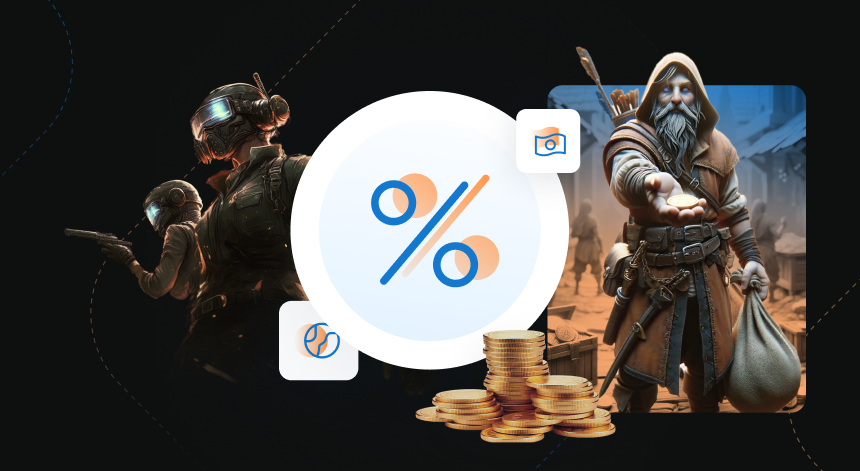The gaming industry is evolving, and developers aiming for higher gross revenue are increasingly exploring direct-to-consumer (D2C) sales through web shops vs. mobile stores. Selling D2C offers several advantages, including better control over customer relationships, brand experience, and profit potential.
However, taking advantage of this shift means that you become responsible for everything that comes with selling games in whatever jurisdictions you sell them in — including setting up an online store and displaying products, having a way to accept and process payments, and especially, taxes.
In this article, we focus on how selling mobile apps and games D2C via web shops can affect your indirect taxes (sales tax and VAT) and what developers need to consider as they start diversifying game monetization.
Whether you want to start big or start small with the D2C model, it’s important for developers and publishers to understand the sales tax and VAT implications of selling D2C via web shops.
Payments Options for Selling Games D2C
When game companies decide to sell D2C, they typically choose between two key service models: using a merchant of record (MOR) model, or by leveraging a payment service provider (PSP). Each model comes with distinct tax responsibilities.
Merchants of Record
A merchant of record is a comprehensive payments and taxes service that becomes the legal entity selling the product. That means the MoR becomes responsible for worrying about the regulatory and sales tax and VAT implications of accepting payments from any of the countries where it sells the product — instead of the software maker or game publisher.
Payment Services Providers
A payment services provider can help businesses sell a product, but it only bridges the gap between the seller and the specialized payments services and networks needed to accept payments, such as payment gateways, payment processors, and a merchant account.
So a PSP simplifies the process of accepting payments, but that’s usually all it does. A PSP will not worry about international taxes and regulations (some PSPs may have add-on services to help with taxes, but those costs can pile up as the package of services becomes more complex).
The Tax Implications of Selling D2C With a PSP or MoR
Payment Service Providers and Taxes: Missing Pieces
A PSP facilitates payment processing but leaves most sales tax and VAT related duties to the game publisher.
Here are a few of the tax responsibilities that PSPs won’t take care of:
- Tax Registration: Registering in U.S. states or international countries where the developer has sales tax and VAT nexus.
- Tax Calculation and Collection: Ensuring that sales tax and VAT is calculated, collected, and remitted accurately.
- Liability Management: Bearing full responsibility for sales tax and VAT related issues, including audits.
- Compliance and Audit Costs: Covering the expenses of in-house or outsourced sales tax and VAT compliance services and audit related fees.
- Invoice Disclosures: Providing correct sales tax and VAT disclosures on invoices.
- E-Invoicing: Issuing e-invoices in countries requiring them.
- Legal Representation: Appointing legal representatives where required.
Merchants of Records and Taxes: Handled for You
An MoR assumes full responsibility of sales tax and VAT compliance because it’s the entity actually selling the product, allowing developers to focus on what matters: game development.
The many benefits of using an MOR include:
- The MoR takes care of all the bulleted points above that a PSP won’t.
- Reduced Legal Exposure: Developers are shielded from direct interactions with tax authorities.
- For example, when one of our customers faced aggressive sales tax and VAT inquiries, FastSpring’s tax team intervened, providing expert representation and achieving a favorable resolution (read more here). Without the kind of tax support an MoR provides, a regular inquiry could lead to a full audit if these taxes are handled in house.
- Expert Tax Support: A dedicated tax team ensures developers stay compliant and can resolve disputes with sales tax and VAT authorities effectively.
Why Choose FastSpring as Your MOR?
FastSpring is how gaming publishers sell in more places around the world. For nearly two decades, FastSpring has been a trusted payment provider you can use to sell games or in-game items on your website, web shop, or embedded directly into your game with fully customizable and branded checkouts just for you.
To further invest in our commitment to supporting game developers, FastSpring hired Chip Thurston as our Head of Gaming. Read the press release here.
FastSpring allows you to offload the complexity of global payments, sales tax and VAT compliance, player payments support, and many other aspects of payments management. Choose A Partner You Can Trust With Your Players™ and spend less time managing your payments and compliance and more time making great games! To learn more about how FastSpring supports game developers, visit fastspring.gg.
Ready to get started? Set up a demo or try it out for yourself.










